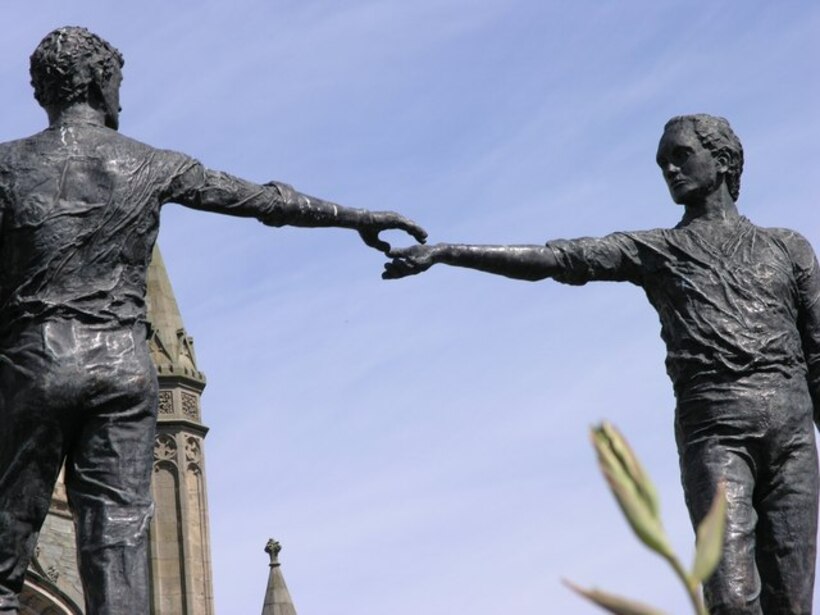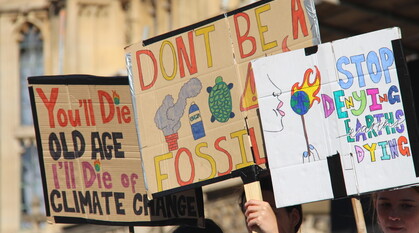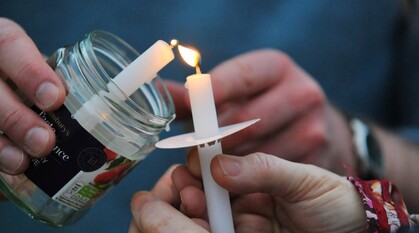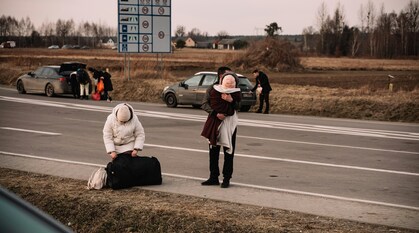Building a lasting peace: 25 years of the Good Friday Agreement
25 years on from the Good Friday Agreement, Siobhán Haire reflects on the conditions for peace in Northern Ireland.

Most people over the age of about 35 with a connection to Northern Ireland will remember the Good Friday Agreement being signed. I do. I grew up just outside Belfast and at Easter 1998 when the Agreement was formalised I was 12 years old, on a canal boat somewhere in England. I wasn't blessed with keen political insight, but even I dimly grasped that what I was hearing on the radio was important.
For all that, I certainly wouldn't consider myself an expert on the Agreement, the Troubles, or contemporary Northern Ireland. I'm at least 10 years too young for the first, 20 years too young for the second and I haven't lived full-time in Northern Ireland for nearly two decades. But my teenage years were immeasurably safer and more normal than those of my parents, largely because of the Agreement and the work which led up to it.
I've watched that period and the build up to it fictionalised through the (excellent) TV show Derry Girls. I can't watch the episode which focuses on the referendum where Northern Irish people overwhelmingly voted for peace, without a bit of a cry at the optimism of the characters, buoyed up and overcoming their personal misgivings.
A post-conflict society?
Northern Ireland has changed enormously since 1998. Airport security is less of a hassle, people no longer just travel there to visit family or go on black taxi tours of Troubles flashpoints and the Irish language is much more in evidence across all communities. In many ways, it's a post-conflict society.
But that's not the whole picture. Although day-to-day life is much more normal in Northern Ireland than it used to be, it's still a place whose political system is not really working, where members of the police service have good reason to be vigilant about their personal security, and which is a constant headache for its near neighbours.
So what does Northern Ireland's journey in the last 30 or so years teach us about peace?
Building relationships
It teaches us that personal relationships and trust build the conditions for peace. The key relationships between the politicians – Northern Irish, British, American, who negotiated the agreement, are well documented. But the necessary relationships weren't just between the star players.
Harking back to Derry Girls again, one of the absolute truisms of the programme is that as a young person growing up in Northern Ireland in the 90s, you were never more than a few metres away from some sort of cross-community youth initiative to get to know the 'other side', (whichever side that might be). Some of those programmes were supported and hosted by Quakers at Quaker Cottage where for decades, Friends and others patiently built relationships, held space, and witnessed to the common humanity of people on both sides of the peace walls.
Towards a lasting peace
It teaches us that peace is fragile, and dependent on the political and social conditions in which it is rooted. While the first 18 years post-GFA generally felt like a steady march away from violence and towards a lasting peace, the seven years since the Brexit vote have rocked that sense of progress. Political intransigence has shaped the years since 2016, with Stormont suspended for almost 4 of the last 6 years, and a slow creep of violence and threat coming out from the shadows.
It teaches us that peacebuilding is a job for patient and persistent optimists. If you look at civil society peace movements in Northern Ireland – and there were many – there's a good argument that they were at their strongest in the late 1960s to the mid 1980s, not the 1990s when the Agreement was finally signed. This isn't to negate their impact, only to say that it didn't bear immediate fruit. And if you look at the timeline leading up to the Agreement, it is full of twists and turns, ceasefires, cessations, changes to political leadership, people making and breaking commitments. Peace grows slowly.
A peace process
It also teaches us that insecurity is a barrier to compromise. The Good Friday Agreement was achieved in a situation where moderate unionism was a more dominant political identity, and where those moderate unionists felt sufficiently brave to enter into a power-sharing arrangement with nationalist parties. In the last few years, unionist protestantism has come more under threat as it becomes the political identity for a smaller segment of the Northern Irish population, and that security which gave politicians the confidence to seek compromise appears to have eroded.
There's no neat ending to this article, just as there is no neat ending to the political journey in Northern Ireland. Peace is a process requiring investment – the investment of money, of personal capital and of time. Are we working to encourage investment in a peaceful future for Northern Ireland?


